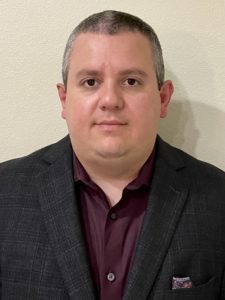Position Spotlight: Virtual Care Unit Recovery Care Coordinator
 Alex was born and raised in Vega Baja, Puerto Rico, and earned his Bachelor of Science in Nursing from the Interamerican University of Puerto Rico in June 2016. Two days after graduating, he moved to New York and worked as a travel nurse in Rochester, Syracuse, and Poughkeepsie. He joined Contessa’s Hospitalization at Home team at Mount Sinai as a Recovery Care Coordinator before relocating to Florida and joining the Virtual Care Unit.
Alex was born and raised in Vega Baja, Puerto Rico, and earned his Bachelor of Science in Nursing from the Interamerican University of Puerto Rico in June 2016. Two days after graduating, he moved to New York and worked as a travel nurse in Rochester, Syracuse, and Poughkeepsie. He joined Contessa’s Hospitalization at Home team at Mount Sinai as a Recovery Care Coordinator before relocating to Florida and joining the Virtual Care Unit.
What does a Virtual Care Unit (VCU) Recovery Care Coordinator (RCC) do at Contessa?
VCU RCCs partner with patients in both the acute and monitoring phase to ensure their treatment plan is completed. We continue working with the patient for up to 60 days to provide support in meeting the patients’ health goals, reducing the risk of return visits to the ED/hospital, and act as a liaison among all health care team providers for that patient.
Briefly describe a day in the life as an RCC.
I log in to all our technology platforms and partner EMRs and look at the patient census. I check to see if we have any staffing updates, create a plan for the day (which patients need to be prioritized, due tasks from previous days, etc), and start working! Usually, there is a meeting somewhere in the middle of the day. I finish the day by making sure all patients have been called and there are no remaining tasks to complete.
Why did you choose a career in nursing?
After completing a bachelor’s degree in science, I realized I liked the science part but not the jobs available. I turned down offers to work on different research projects and started thinking about what I could do next. I knew I wanted to move to the US and after much analysis decided to pursue nursing. I decided to choose a career in nursing for many reasons:
- There is a growing demand for nurses. I realized by studying nursing I would have many work opportunities anywhere I decided to move.
- Nursing provides diverse career paths. I could work in a surgical unit, emergency department, trauma, informatics, community nursing, travel nursing, and more. I liked that one career offered so many possibilities!
- I get the opportunity to work with diverse patient populations and work environments. I liked the idea of traveling for work and was interested in travel nursing and being able to help understaffed hospital systems.
- I get the opportunity to study the science of caring for others. Nursing aligns with my previous education and allows me to be a positive influence on patients’ lives.
How does Home Recovery Care differ from a traditional nursing job?
If a traditional nursing job means bedside nursing or direct patient care Home Recovery Care is very different! In my experience, being a bedside nurse means taking care of a patient for a 12-hour shift and making sure they receive all the care and advocacy needed to recover from an acute disease. Once you finish your shift or the patient is discharged, there is no guarantee that the patient will follow their recommendations. I remember in my bedside nursing experience having many patients who were very well known to the staff for frequent hospitalizations.
Home Recovery Care gives me the opportunity to care for patients during the acute phase of hospitalization, but at home. I get to continue following up with the patient after discharge and coach them on improving his/her health. Home Recovery Care is an innovative care model that is adapting to the new needs and challenges of healthcare.
How are you able to do your job remotely?
I am able to work remotely because of Contessa’s advanced technology. However, I did have the opportunity to work in the field first. Once upon a time, I was an ED Recovery Care Coordinator admitting patients in Mount Sinai’s Hospitalization at Home program. That experience helped me understand the purpose of Home Recovery Care and made me want to learn about the patient experience after they are discharged from my services. My experience with travel nursing also helps me to engage with my patients remotely.
What is the best part of your job?
One of the best parts of my job having the opportunity to work with all of Contessa’s markets and patient populations. The other best part is the team. Can’t really decide which is better!
What’s the most challenging part of your job?
When you work in an inpatient setting, you have every resource at your fingertips. Hospitals have pharmacies, physical therapists, medical teams, etc. The most challenging part of my job is finding ways to provide that same inpatient level of care to a patient at home. I am responsible for coordinating all the care needed for the patient from different sources as compared to a hospital setting.
What inspires you to come to work every day?
I wake up and remind myself I am part of this innovative care model that is changing healthcare. I love telling people what I do for a living. Contessa provides care for patients who need to be admitted to the hospital at home. After discharge, we continue to follow the patient to ensure positive outcomes and coach the patient to improve their health. Hospital level of care at the comfort of your own home… with follow up after discharge. Sounds really good to me!
